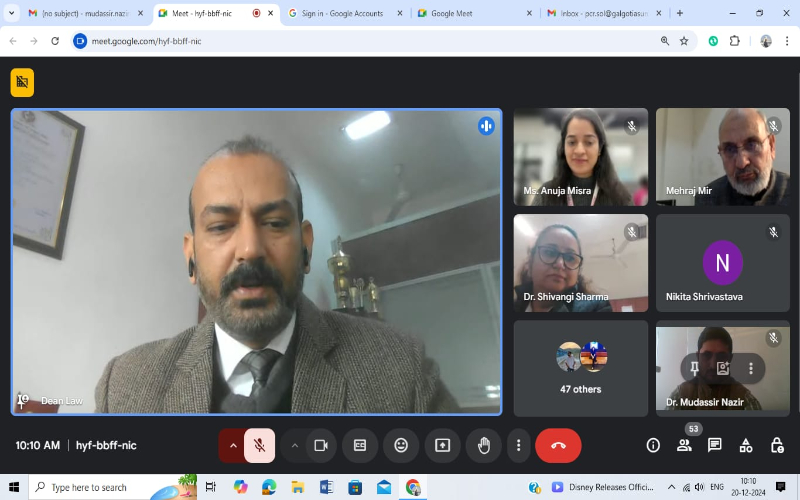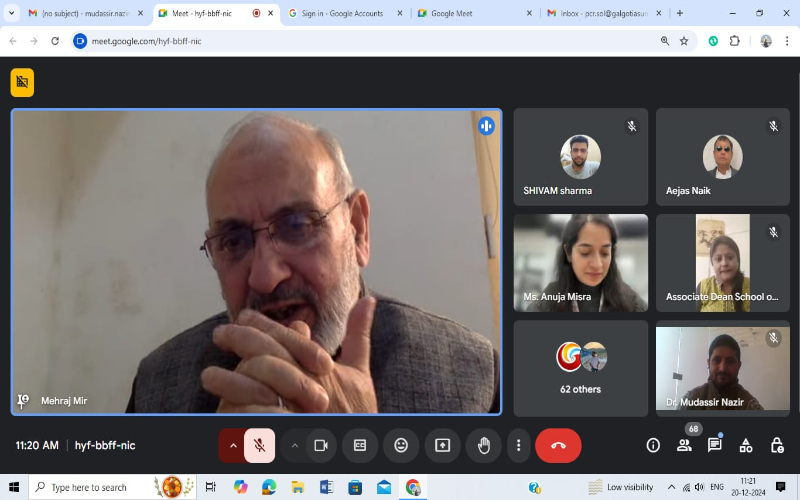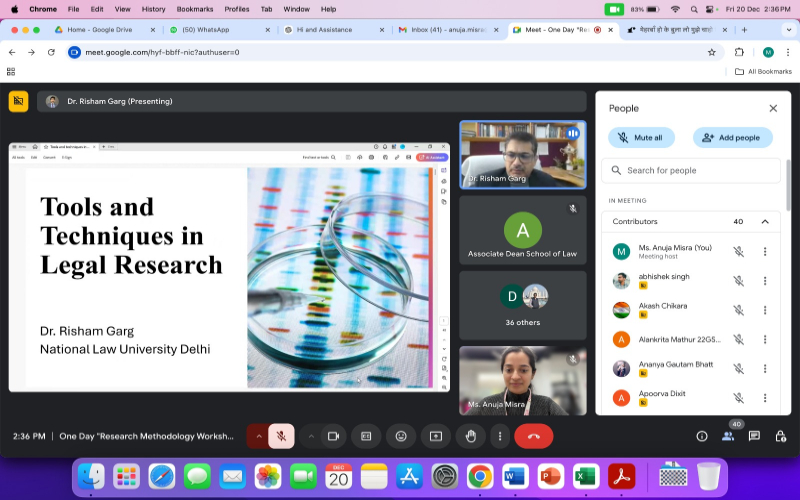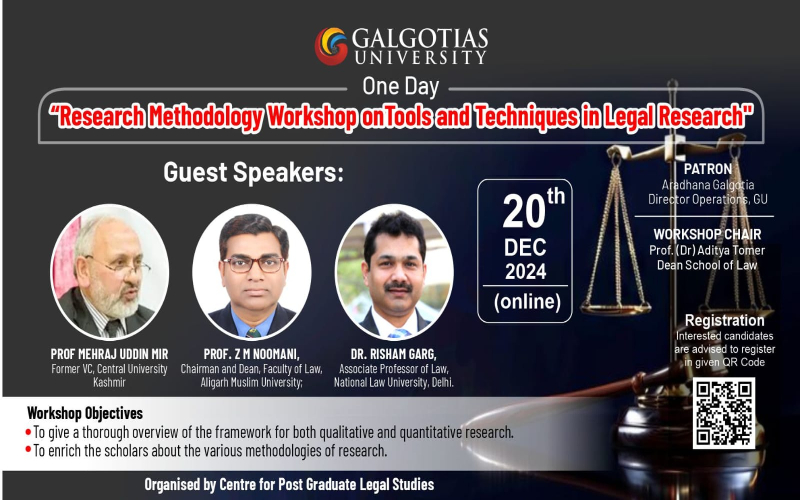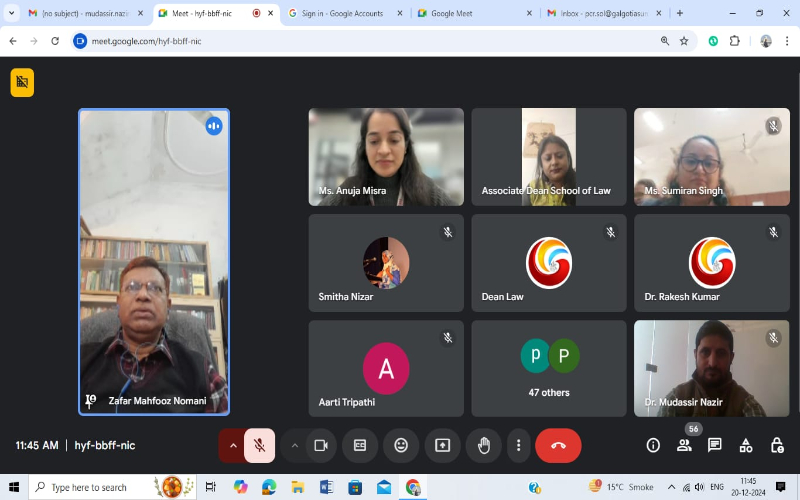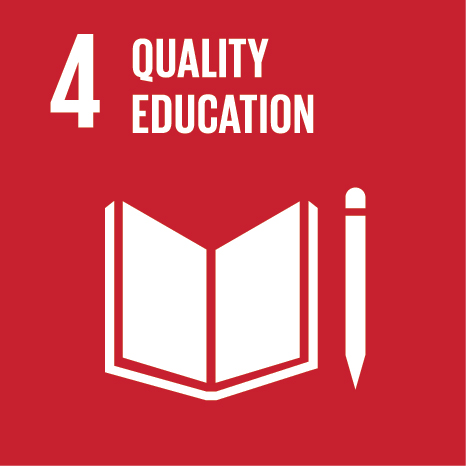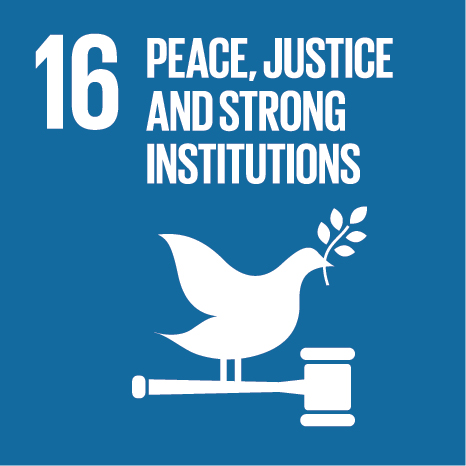Research Methodology Workshop on Tools and Techniques in Legal Research
Event Date : 20th December 2024
Centre for Post Graduate Legal Studies, Galgotias University, School of Law organised a one-day online “Research Methodology Workshop on Tools and Techniques in Legal Research” on December 20, 2024, for LL.M and PhD scholars. The event saw participation from 70 students and faculty members.
The workshop commenced with Prof. (Dr.) Aditya Tomar, Dean welcome address, emphasising the workshop’s importance. Dr. Anuja Misra introduced the first speaker, Prof. Mehrajuddin Mir, former VC of Central University Kashmir. Prof. Mir highlighted the essence of legal research—contributing to existing knowledge by identifying gaps and formulating research questions. He discussed research methodology, literature reviews, and citation techniques like Bluebook and OSCOLA, while emphasizing originality and critical thinking.
The second session, led by Prof. Z.M. Noomani of Aligarh Muslim University, covered the use of Scopus indexing, prioritizing research questions, and the “rule of seven” for structuring papers. He also addressed grammar and plagiarism tools like Turnitin, underscoring the importance of unique and substantive research.
In the third session, Dr. Risham Garg from Delhi National Law University elaborated on data collection methods, comparative research, and citation styles. He provided practical insights into avoiding plagiarism and ensuring academic integrity. Each session included interactive Q&A rounds, concluding with votes of thanks from faculty members.
Event Detailed Description
Centre for Post Graduate Legal Studies, Galgotias University’s School of Law organized a one-day online workshop titled “Research Methodology Workshop on Tools and Techniques in Legal Research” on December 20, 2024. The event catered to LL.M and PhD scholars, attracting 70 participants, including law professors and students. The workshop aimed to enhance participants’ understanding of legal research methodologies and tools. The Workshop was supervised by Prof. (Dr.) Shivangi Sharma (PC -LLM), Dr. Mudassir Nazir (PCR), Dr. Anuja Misra, and Dr. Devanshi Singh.
Opening Session
Prof. (Dr.) Aditya Tomar, Dean with his welcome address, highlighted the workshop’s objectives and its significance for budding researchers. Dr. Anuja Misra introduced the first speaker, Prof. Mehrajuddin Mir, former Vice Chancellor of Central University Kashmir. Prof. Mir discussed the foundational aspects of legal research, emphasising its role in adding value to existing knowledge. He explained the process of identifying research gaps, formulating topics, and the importance of mentoring in refining research ideas. He recommended that students adopt tailored methodologies suited to their research objectives and not rely solely on standard formats. Prof. Mir stressed the need for exhaustive literature reviews to establish relevancy and identify gaps, guiding scholars on using tools like Manupatra, SCC Online, and Indian Kanoon. He also discussed citation techniques, including Bluebook and OSCOLA, and encouraged applying Boolean operators and advanced search options for effective online research.
Second Session
The second session was conducted by Prof. Z.M. Noomani, Chairman and Dean of the Faculty of Law at Aligarh Muslim University. Prof. Noomani focused on using Scopus indexing effectively and prioritizing research questions to maintain focus and relevance. He elaborated on structuring research using the “rule of seven,” which recommends organising papers into seven substantive chapters to ensure clarity and coherence.
Prof. Noomani also addressed practical aspects of research, such as using tools like Turnitin and iThenticate for plagiarism checking and Quillbot for grammar enhancement. He emphasised intellectual property rights (IPR) and the importance of originality in research. Regarding publication, he clarified that publishing in Scopus-indexed journals is not mandatory under UGC rules but can enhance the academic impact of research. During the interactive Q&A, he explained how research questions and objectives should focus on core issues rather than peripheral ones, aligning with the study’s broader purpose.
Third Session
Dr. Risham Garg, Associate Professor at Delhi National Law University, led the third session. He explored the types and utility of legal research, such as fundamental, non-utilitarian, and market-based research. Dr. Garg detailed data collection methods, including sampling techniques and instruments, and emphasized the importance of time management in research. He provided examples of comparative studies, such as competition law comparisons between India and the European Union, to guide students on selecting appropriate jurisdictions.
Dr. Garg concluded with insights on citation and referencing styles like Bluebook, OSCOLA, and APA, stressing the need for accuracy and academic integrity. He underscored the dangers of plagiarism and the importance of originality in writing. The session ended with interactive exercises, allowing students to apply the concepts learned.
Conclusion
The workshop provided a comprehensive overview of legal research methodologies, focusing on originality, critical thinking, and effective use of tools. The event concluded with votes of thanks from Dr. Shivangi Sharma, Professor of Law, who acknowledged the contributions of the speakers and participants.
Department Name – School of Law
Event Outcome
- Enhanced Understanding of Legal Research Methodology
Participants gained a deeper understanding of the core aspects of legal research:
- Identifying research gaps and formulating research questions.
- Selecting relevant topics and methodologies tailored to research objectives.
- Conducting comprehensive literature reviews to support hypotheses.
- Practical Insights into Research Tools and Techniques
- Legal Databases: Tools like Manupatra, SCC Online, and Indian Kanoon were introduced, emphasizing their effective use through advanced search techniques, Boolean operators, and keyword optimization.
- Citation Styles: Guidance on citation methods such as Bluebook, OSCOLA, and APA ensured scholars understood the importance of proper referencing to maintain academic integrity.
- Structuring and Writing Research
- The “rule of seven” concept for organizing research papers was introduced, providing a clear structure to maintain focus and clarity.
- Scholars were encouraged to create substantive chapters, ensuring coherence and readability.
- Focus on Originality and Plagiarism Avoidance
- Tools like Turnitin and iThenticate were recommended to check plagiarism and maintain originality.
- Emphasis was placed on intellectual property rights (IPR) and respecting other authors’ works while ensuring the researcher’s unique contribution.
- Insights into Publishing
- The importance of publishing in Scopus-indexed and other reputable journals was clarified, along with guidance on aligning research outputs with journal requirements.
- It was highlighted that publication in Scopus-indexed journals is not mandatory under UGC guidelines but enhances the research’s academic and professional impact.
- Practical Data Collection and Analysis Techniques
- Various data collection methods and sampling techniques were introduced.
- Guidance was provided on comparative legal studies, including jurisdiction selection and aligning research topics with policy similarities between countries.
- Skill Development through Interactive Exercises
- Participants engaged in hands-on activities to practice research planning, identifying gaps, and structuring papers.
- Interactive Q&A sessions allowed participants to clarify doubts and refine their research approaches.
